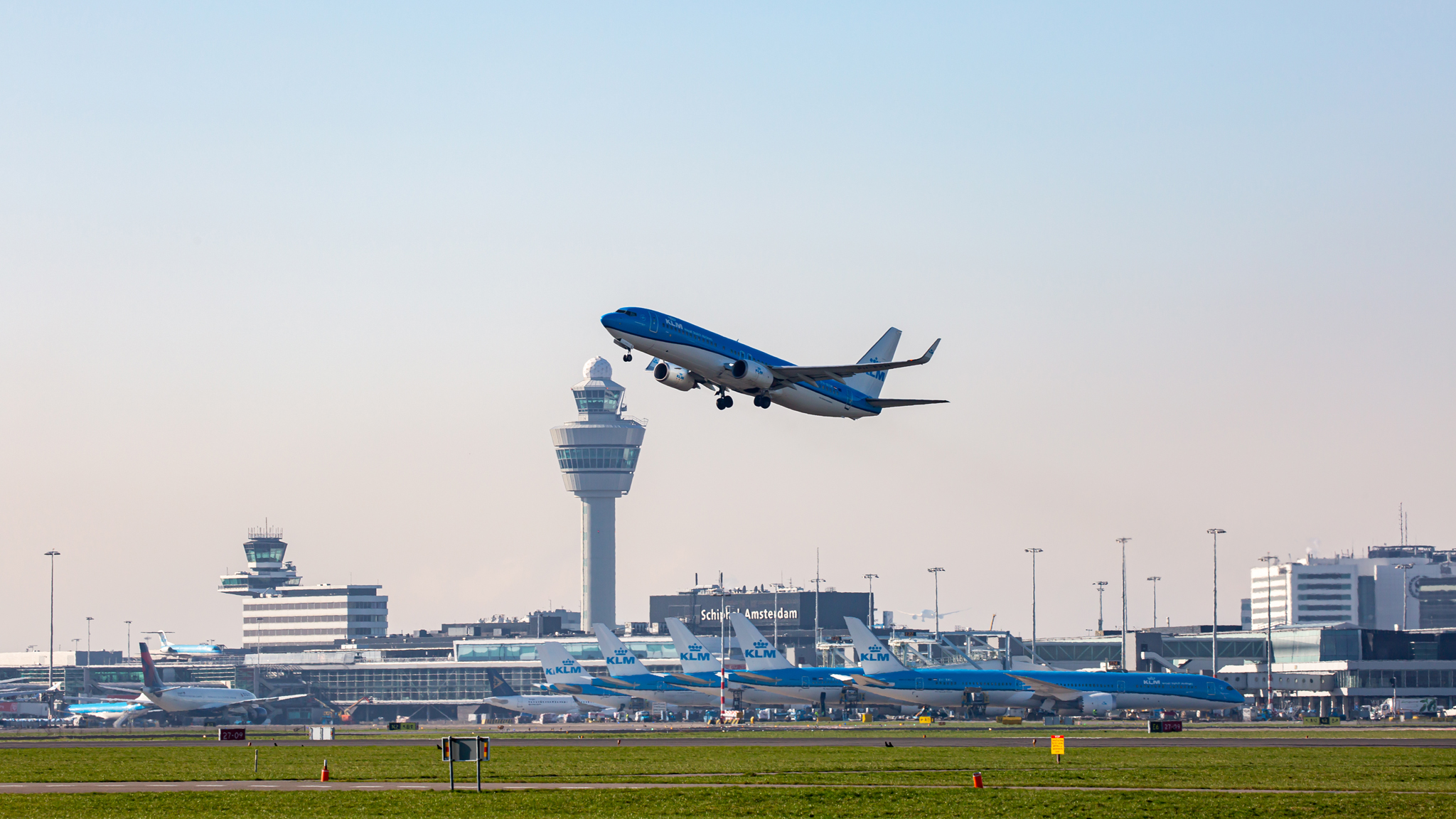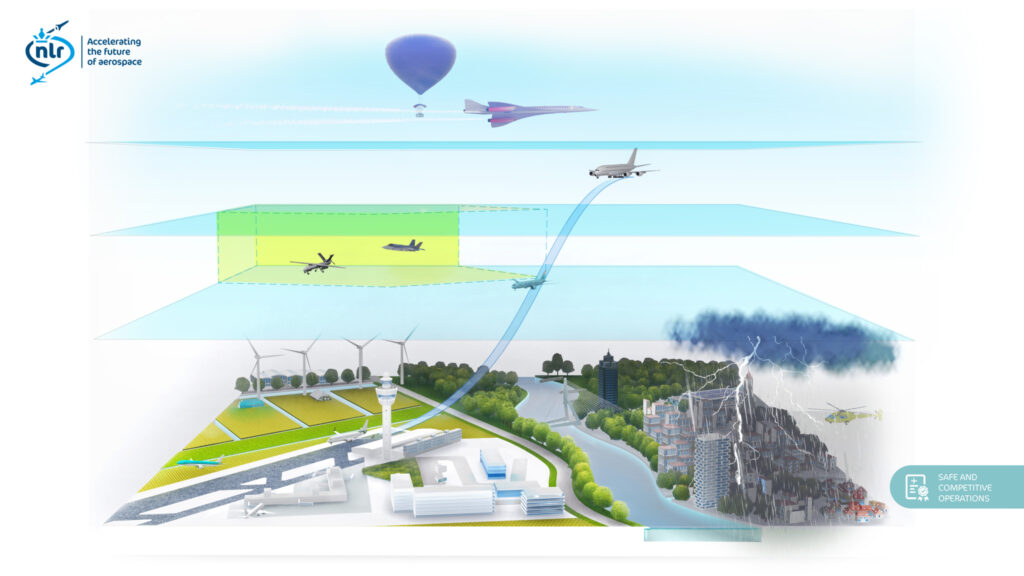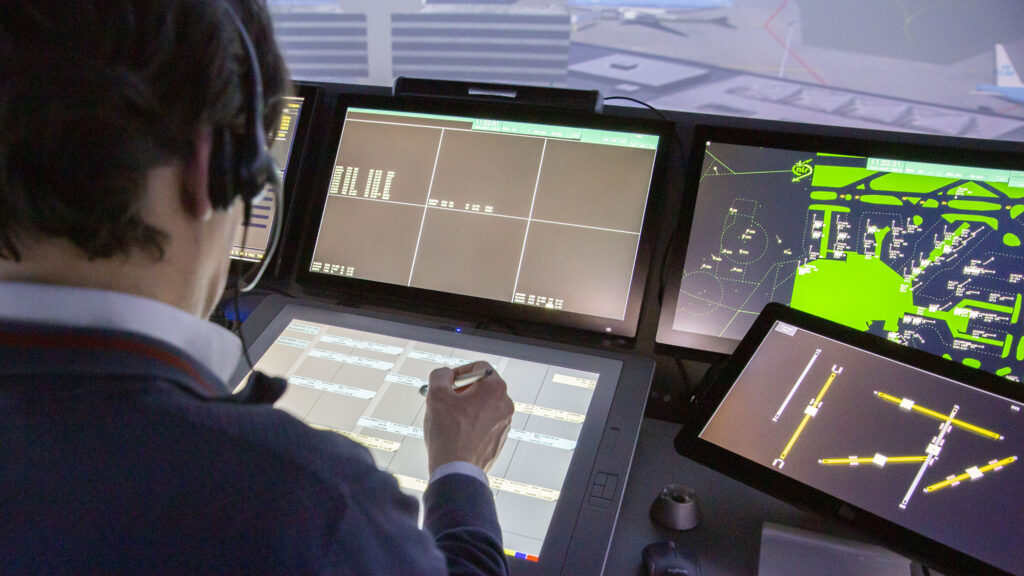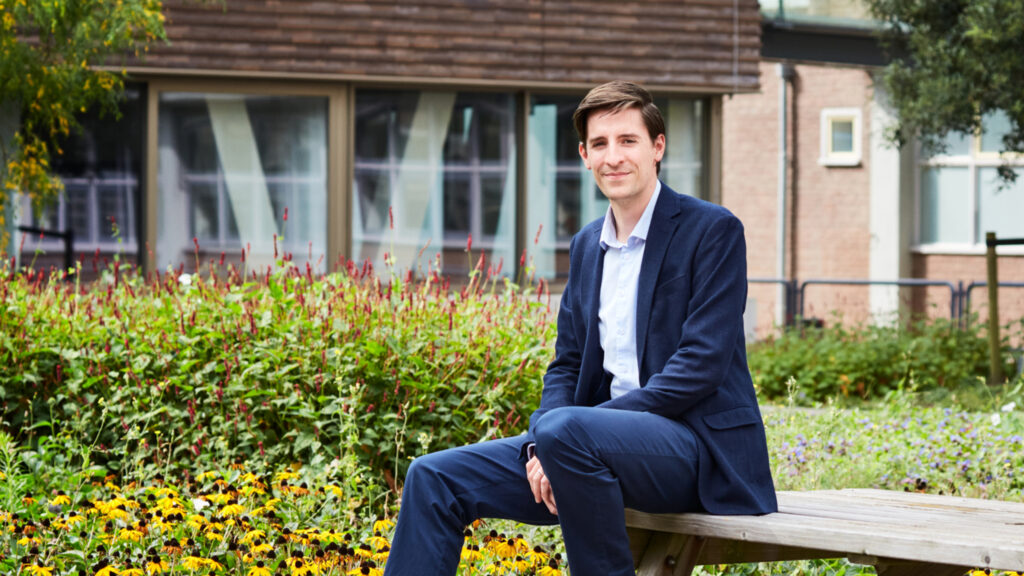
Safe and competitive operations – background interview
Aviation is indispensable from both the economic and social perspectives. But there is a flip side too. The sector does create environmental pollution and aircraft generate quite some noise nuisance. Numerous developments are underway looking for solutions for this. Slowly but surely, sustainable aircraft are being introduced and completely new aircraft types are coming to the fore. But how do all the new and existing users of the airspace fit together? How can we create an efficient, sustainable and progressive system? That is what the NLR knowledge programme Safe and Competitive Operations is focusing on.
“Effective cooperation in the skies”
– Programme leader Nick van den Dungen
What does the knowledge programme involve?
“The relatively small patch of airspace above the Netherlands is used very intensively. Take small aircraft and helicopters, for instance, or large passenger planes… and then there are military aircraft, up-and-coming craft such as drones and new spacecraft that can operate in the upper strata of the airspace. Getting all those users to work together efficiently and safely is going to need research. That’s what we’re doing in the Safe and Competitive Operations programme. We’re looking at how you can help all the users in the Netherlands to utilise the airspace safely, sustainably, efficiently and effectively. For instance, we’re looking at the options for making use of machine learning and other new technologies, and how using them in operational situations can be made demonstrably safe.”
“Within the programme, we often collaborate with governmental authorities, for example with the Ministry of Infrastructure and Water Management or the Defence Department, because both those ministries have a vested interest in the optimum use of Dutch airspace for civil and military aviation. As the process progresses, we work a lot with the commercial sector too. Companies are often the end users of a product, so it’s important that they also share in the development. That lets us make sure that everything fits together as well as possible.”
Strategic programme: Safe and competitive operations
This programme helps governmental authorities, the aerospace sector and society meet the challenges by making the aerospace sector in the Netherlands safer, more resilient and more cost-effective, now and in the future, and to make civil and military aviation, and society, safer.
Click on the visual to enlarge.

Could you give an example of a project?
“The Dutch authorities are currently undertaking a large airspace redesign project for better allocation of the use of the airspace, including changes to make sustainable aviation possible on a large scale. NLR is involved in various projects that are doing research for this, including work in the European context through Single European Sky Air Traffic Management Research (SESAR). Organisations throughout Europe are probably facing the same issues that we are; working on them together is then not only nice to do but also instructive.”
“In one of those projects – ITARO – we looked at integrating sustainable aviation operations, including fixed approach routes. The optimum route lets planes descend continuously during the landing, which needs less engine power and so reduces fuel consumption and cuts down noise nuisance. Above all, we looked at the corresponding air traffic control actions for Schiphol. We used experiments on the NARSIM air traffic simulator and test flights with the Cessna Citation II research aircraft to show how innovations can be implemented safely in a simulated operational environment.”
“Flight routes to Schiphol are largely set out in advance nowadays, but the very last piece to the landing runway is only defined by the air traffic controllers at the last minute. It depends on how busy the airport is, for instance, as well as the wind direction and other meteorological factors. On top of that, it’s obviously important that aircraft mustn’t get too close to each other, for safety reasons. The research done at NLR is helping make the activities of the operational parties – the airlines and air traffic control, for instance – more sustainable.”
Digitalisation is key
“Coordinating and controlling the aircraft in the vicinity of the airport is now often done manually. To make sure everything goes smoothly, planes regularly have to fly an extra bit or bank round before they get permission to land. That means they’re using fuel, there are extra emissions and more noise nuisance – particularly when planes are flying relatively low, at six to nine hundred metres above the ground. We can find more sustainable solutions thanks to innovations and by tackling the flight process from the airport in a more planned way.”
“For now, this is still about aircraft that fly on kerosene, but in the future it will also be important to study what the best way is to handle electrically powered or hydrogen-powered craft. With that aim, we work a lot within NLR with the Climate-Neutral Aviation programme, which studies aircraft that are propelled by batteries, hydrogen or sustainable aviation fuel (SAF).”
“We can find more sustainable solutions thanks to innovations.”

Why is it important to keep doing research?
“The aviation industry has grown a lot over recent decades. That means that systems that used to work nicely are now coming up against their limits, so it’s important that we keep renewing them and developing them. Take the way an air traffic control tower works when handling planes that are landing and taking off. Until a few years ago, strips of paper were often still used for handling the aircraft. NLR carried out studies using digital strips together with the air traffic control organisations. That digital system was later put into use for real. Studies of improvements and sustainability gains in aviation let us make sure that the Netherlands remains relevant and competitive in Europe and the world as a whole.”
A place for new aircraft
“On top of that, it’s crucial to look to the future, at possible new aircraft types and how to integrate them into the airspace. Take supersonic or hypersonic craft, for example – planes that can fly many times faster than the current types. We will have to handle them very differently from traditional passenger aircraft. There is also research being done into launching satellites using a small rocket from a plane. Developments like that also have consequences for existing aviation.”
“Quite aside from new aircraft types, the increasing amounts of space junk are becoming a problem. There’s a risk that some of it will come down to Earth, which would have consequences for aviation safety. So that’s something we have to be properly prepared for.”

An integral system for greater impact
“2025 is the end of NLR’s current strategic period. In that year, we want to give a major demonstration of various techniques and how they can be integrated into the airspace. We’re looking at sustainable aviation, for example, and the advent of various types of drones. At the moment, those are all separate studies and demos; we want to merge them into a single whole. That’s how we want to show the commercial and governmental sectors what the Dutch aviation industry is going to look like in a few decades’ time. That’s crucial for getting innovations used in practice in the end, and creating the impact that is needed.”
About the programme leader
Nick van den Dungen is an aerospace engineer and project leader, as well as the leader of the Safe and Competitive Operations programme. He has been fascinated by aircraft all his life.
“I still find it astounding that such a heavy piece of equipment with all those complex engines and what have you can stay up in the air. Aviation keeps people connected – families who live on the opposite side of the world, for example. But aviation also causes noise nuisance and emissions of hazardous substances. I want to do something about that. I want to keep motivating people within NLR and elsewhere, getting them to be enthusiastic about making aviation better and cleaner.”
